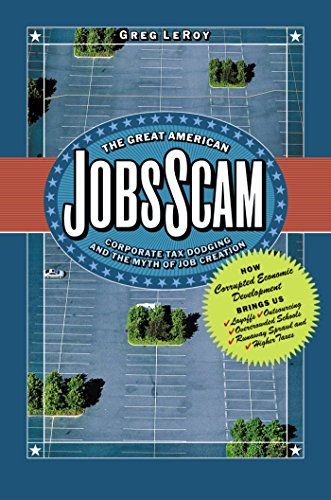The History and Origins of Site Selection
If you've ever wondered where economic development came from, you'll find this history of site selection fascinating. If not, you might want to skip this.

Table of Contents
If you're like me, you sort of stumbled into a career in economic development. Have you ever wondered about the origins of the profession, and of the site selection industry? I did.
With a little research, I turned up this book: The Great American Jobs Scam by Greg LeRoy. While it is not very flattering, it is very well researched.
LeRoy's description of the origins of site selection is fascinating, and I hope that you enjoy it as much as I do.
In the depths of the Great Depression, a young Chicago industrial real estate salesman named Leonard Yaseen grew impatient with his father-in-law and boss, Felix Fantus. The old man was doing a lot more for his corporate clients than helping them buy and sell real estate. He was giving companies that sought to relocate their factories information not just about land and buildings, but also about transportation and utilities, local wages and taxes. He had been doing this since 1919, when he performed his own site location search to move his chair-manufacturing plant from Chicago to Indiana. Fantus was giving all this valuable information away for free, and Yaseen thought they should be charging for it.
Unable to convince Fantus that his insights could be commodified into a business, in 1934 Yaseen left Chicago for New York, with his father-in-law’s blessing. For a year and a half, he immersed himself in data about rail service, labor skills and wages, utilities, raw materials, and taxes. Then he sent a pitch letter to lots of Manhattan-based manufacturing companies, and one hired him.
Thus was born the Fantus Factory Locating Service, one of the most powerful yet obscure consulting firms in U.S. history. Yaseen’s fledgling business slowly took root through the rest of the Depression and World War II, and then boomed after the war. It prospered so much, he was able to buy a major stake in the Fantus real estate company in Chicago and immediately converted it to site location consulting as well. Another son-in-law of Felix Fantus, Maurice Fulton, would come to head that office.
For the next four decades, Fantus dominated the site location consulting industry, playing a central role in the relocation of thousands of workplaces, most of them factories moving out of the Northeast and Midwest to the South. By its own count, Fantus had helped engineer more than 4,000 relocations by the time Yaseen retired in 1977, and it shepherded 2,000 more in the next decade. Fantus also did extensive work overseas as early as the 1950s, working for U.S. companies seeking sites in at least a dozen other countries.
Fantus survives today as part of Deloitte.

Econ Dev Show Newsletter
Join the newsletter to receive the latest updates in your inbox.


